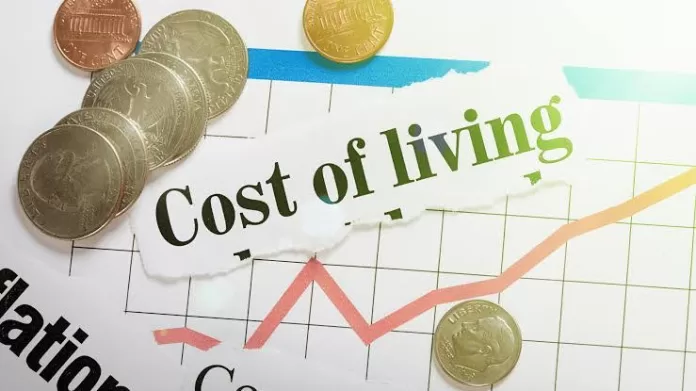The recent global and domestic events have had profound effects on the Nigerian economy, leading to an alarming increase in poverty levels and cost of living. According to the National Bureau of Statistics (NBS), approximately 133 million Nigerians were classified as multidimensionally poor in its 2022 report. The rising fuel prices not only increase transportation costs but also lead to elevated prices for essential goods, making it increasingly difficult for families to afford basic necessities. This situation is especially dire for those already struggling with food inse
This alarming trend is closely linked to the ongoing cost-of-living crisis, which threatens to push even more Nigerians into poverty. The World Bank projects that by the end of 2024, about 70% of Nigerians will likely live below the poverty line, positioning Nigeria as home to the second-largest impoverished population in the world, following India. This situation is further illustrated by a stark decline in real consumption, which has fallen more than twice as much as nominal consumption, reflecting the crippling impact of soaring prices on household budgets.
Rising Costs of Living on Household.
The rising cost of living in Nigeria has placed immense pressure on households, fundamentally altering their ability to manage daily expenses. As prices for essential goods and services continue to soar, families are forced to make difficult choices about how to allocate their limited resources. This situation is particularly dire for low- and middle-income households, where even minor increases in costs can lead to significant financial strain.
Food prices have been among the hardest hit, with staple items becoming increasingly unaffordable. For example, the cost of basic groceries has skyrocketed, impacting meal planning and nutrition. Families often find themselves sacrificing quality or quantity to make ends meet, leading to poorer health outcomes over time. The emotional toll of worrying about food security adds an additional layer of stress, particularly for parents trying to provide for their children.
Housing costs have also risen sharply, making it difficult for many to maintain stable living conditions. Rent increases and maintenance expenses can lead to a situation where families are forced to downsize or relocate, often to less desirable areas that may lack essential services and security. This instability can affect children’s education and overall family cohesion.
Transportation costs have surged as well, particularly due to rising fuel prices. Commuting to work or school has become a significant financial burden, limiting job opportunities and access to essential services. Families may opt for less reliable transportation options or reduce travel altogether, further isolating them from opportunities for advancement.
The psychological impact of the rising cost of living cannot be overstated. Anxiety over financial security can lead to stress-related health issues and strain relationships within households. The constant worry about making ends meet can create a cycle of despair that impacts every aspect of family life, from mental health to social interactions.
In response to these challenges, many households are diversifying their income sources, seeking additional jobs or entrepreneurial opportunities to supplement their earnings. However, this approach is not feasible for everyone, especially those already juggling multiple responsibilities.
READ ALSO: Top 5 Banks With Lowest Loan Rates For Small Businesses in Nigeria
Causes of the Rise in Cost of Living in Nigeria
1. Fuel Subsidy Removal
One of the most significant factors exacerbating the cost-of-living crisis has been the removal of fuel subsidies. In June 2023, newly elected President Bola Tinubu announced the complete withdrawal of fuel subsidies, resulting in premium motor spirit (PMS) prices soaring from ₦238 per litre in May 2023 to an average of ₦626.2 per litre by September 2023. By January 2024, prices further escalated to ₦668.30 and reached ₦770.5 in July. The immediate aftermath of this policy change saw transportation costs surge, contributing to a 25.2% year-on-year increase in transport inflation as of July 2024.
Fuel subsidies have been a staple of the Nigerian economy since the 1970s, helping to keep fuel prices below market rates. However, the abrupt removal has triggered a cascade of price hikes, with PMS prices experiencing a staggering 210% year-on-year increase in June 2023, peaking at 227% by September. This fuel price surge has had a ripple effect, driving up the costs of goods and services across the board.
2. Inflation
Nigeria has experienced significant inflation in recent years, driven by various factors, including fluctuating oil prices and increased production costs. The inflation rate has surged dramatically, often exceeding 18% annually, putting immense pressure on consumers as basic necessities become more expensive.
The World Bank reported that the relentless rise in consumer prices significantly erodes Nigerians’ purchasing power, particularly for essentials such as food, housing, and clothing. As of July 2024, the inflation rate soared to approximately 33.4%, contrasting sharply with a minimum wage of ₦30,000 (around $18.87) per month. This disparity means that many households struggle to make ends meet, as their incomes fail to keep pace with rising prices.
3. Exchange Rate Depreciation
Compounding these challenges is the depreciation of the Nigerian Naira against major currencies, which has led to higher import costs. As a country heavily reliant on imports for food and essential goods, the Naira’s devaluation has a direct impact on prices. Families find it increasingly challenging to afford even basic items as import prices rise, creating a cycle of financial strain that affects their overall quality of life.
4. Insufficient Minimum Wage
Despite the government’s recent announcement to increase the minimum wage to ₦70,000, this amount translates to only about $44 a month, which is insufficient to counteract the prevailing inflation. The minimum wage has drastically decreased from $82 in 2019 to about $20.98 in April 2024, before falling further to $18.87 in July. This decline highlights the severe impact of ongoing exchange rate depreciation on household earnings.
The disconnect between minimum wage and inflation in Nigeria presents a stark reality for workers and their families. The minimum wage does not keep pace with the rising cost of living, leading to a significant gap between earnings and essential expenses. Despite recently approved increases, the minimum wage remains insufficient to address the broader economic challenges, forcing many families to struggle to afford basic necessities.
Employers are often reluctant to implement wage increases, citing economic constraints and uncertainty. This hesitance exacerbates the financial strain on workers, particularly as inflation continues to escalate. The ongoing economic challenges have severe implications for the mental, emotional, and physical well-being of Nigerians. High inflation rates contribute to increased stress and anxiety, negatively impacting personal relationships and overall quality of life.
Small and medium enterprises (SMEs) face particularly harsh conditions in this environment. Many businesses find it difficult to pay existing employees, let alone hire new staff. The looming threat of job loss affects even those currently employed, regardless of their experience or connections. This anxiety leads to a challenging work atmosphere where fear of instability prevails, undermining productivity and morale.
6. Agricultural Challenges
Agricultural productivity in Nigeria faces numerous challenges, including poor infrastructure, climate change, and inadequate investment. These issues affect food production, resulting in lower supply and higher prices for staple foods.
7. Economic Instability
Broader economic instability, characterized by fluctuating exchange rates, political uncertainty, and security concerns, creates an unpredictable environment for businesses and consumers alike. This instability contributes to rising costs and hampers economic growth.


